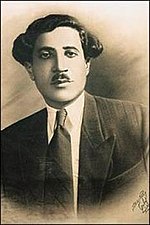
Back إلياس أبو شبكة Arabic الياس ابو شبكه ARZ الیاس ابوشبکه AZB Ilyas Abu-Xàbaka Catalan الیاس ابوشبکه Persian Elias Abou Chabaki French אליאס אבו שבכה HE Abu Szabaka Iljas Polish Абу Шабаки, Ильяс Russian Iljas Abu Šabaka Slovenian
Elias Abu Shabaki | |
|---|---|
 Elias Abu Shabaki | |
| Born | Elias Youssef Abu Shabaki May 3, 1903 Providence, Rhode Island, US |
| Died | January 27, 1947 (aged 43) Beirut, Lebanon |
| Pen name | Rassam, 'Asabsab, Abu Nassif, Al-Shater Hassan[1] |
| Occupation |
|
| Nationality | Lebanese |
| Genre | Romantic poetry |
| Literary movement | An-Nahda, Comparative literature, Romanticism[2] |
| Spouse | Olga Saroufim |
| Signature | |
 | |
Elias Abu Shabaki (also spelled Ilyas Abu Shabaka; Arabic: الياس أبو شبكة, May 3, 1903 – January 27, 1947) was a Lebanese writer, poet, editor, translator and literary critic, he was one of the founders of the literary League of Ten and is considered as one of the leading figures of the Arabic Nahda Movement.[3][4]
Born into a well-to-do Lebanese family, Abu Shabaki became interested in poetry at a young age. The son of a merchant, he was left fatherless in his youth, an experience that would mark his earlier works. Elias worked as a teacher, translator and -in addition to publishing several volumes of poetry- as a journalist writing for many Arabic newspapers and literary magazines. Being an adherent to the Romantic school, Abu Shabki believed in inspiration and denounced conscious control in poetry. His poems were gloomy, deeply personal and often contained biblical overtones centering on his internal moral conflicts. Some of Abu Shabaki's work was very controversial in its time, particularly his poetry collection Serpents of Paradise which was regarded as obscene due to its overt sexual content. The poet's obsession with the spiritual consequences of carnality that was manifested in his writings was attributed to the guilt brought upon by his sexual escapades with various women when he was married and until his death from leukemia in 1947.
Abu Shabaki called for the renewal and modernization of Arab literature, he inspired succeeding generations of poets. His contributions to literature were commemorated by turning his house in his hometown of Zouk Mikael into a museum.
- ^ almoajam staff. إلياس أبو شبكة. معجم البابطين لشعراء العربية في القرنين التاسع عشر والعشرين (in Arabic). almoajam.org. Archived from the original on 2011-07-25. Retrieved 2011-02-27.
- ^ al-Khatib, Hussam (2004). الأدب المقارن (in Arabic). Arab encyclopedia. Archived from the original on 2011-07-07. Retrieved 2011-01-30.
- ^ Bosworth, Clifford Edmund (1980). The Encyclopaedia of Islam. Vol. 12. Brill Archive. pp. 33–34. ISBN 978-90-04-06167-5.
- ^ Cite error: The named reference
thawrawas invoked but never defined (see the help page).
© MMXXIII Rich X Search. We shall prevail. All rights reserved. Rich X Search